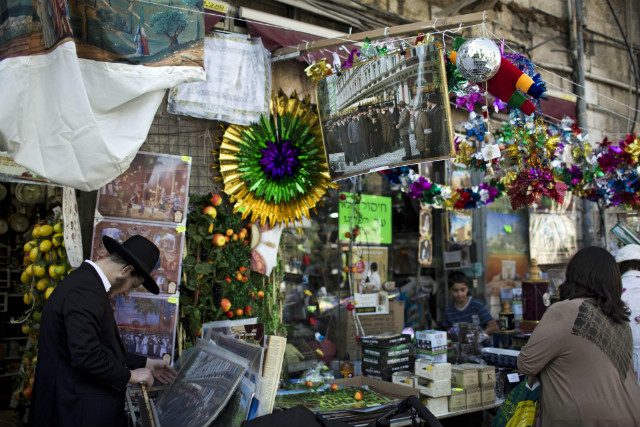SUMMARY
This is AI generated summarization, which may have errors. For context, always refer to the full article.

After the brief clashes on what was the last day of the Muslim Eid al-Adha holiday, Palestinian protesters prepared “to defend” the mosque during the 8-day Jewish festival, stocking stones inside the shrine and planning to sleep in it.
The Sukkot holiday which started at sunset is expected to lead to an increase in Jewish visitors to the Al-Aqsa compound, known to Jews as the Temple Mount.
In Sunday’s disturbances, young masked Palestinians “threw stones and fireworks at police and border police forces,” who responded with “riot dispersal means,” police said.
Calm returned to the compound later in the morning and most police were withdrawn, an Agence France-Presse (AFP) journalist reported.
Muslims have been alarmed by an increase in visits by Jews and fear rules governing the compound will be changed.
Al-Aqsa, the third holiest site in Islam, is also the most sacred place in Judaism. Jews are allowed to visit but not to pray to avoid provoking tensions.
Israeli Prime Minister Benjamin Netanyahu has said repeatedly he is committed to maintaining the status quo at the site despite the views of some hardliners within his governing coalition.
Visits by Jews were stopped on Sunday and age restrictions on Muslim men entering the compound lifted for the Muslim holiday. But a ban on under-50s was re-imposed as Sukkot started.
Recent weeks have seen a series of Jewish holidays during which there has an been an uptick in visits by Jews that have sparked repeated clashes. The same situation is feared over Sukkot.
‘Defend our mosque’
The radical northern branch of the Islamic Movement in Israel and the Higher Arab Monitoring Committee, which represents Arab communities in Israel, had urged Muslims to go to the compound to defend it on Sunday.
Around 150 people were seen at the compound sporting green Islamic Movement caps, as well as several Arab Israeli deputies.
“Al-Aqsa is a holy place, but it is also a national symbol for Palestinians and all Arabs,” said Sheikh Kamal Khabit, deputy head of the Islamic Movement.
“Jewish extremists want to destroy Al-Aqsa to build a third temple.”
According to Biblical tradition, the first and second Jewish temples were located at the site and destroyed by the Babylonians and the Romans.
A hardline Jewish minority has sought to build a third temple.
“We’re going to defend our mosque,” said a 21-year-old man in a tracksuit and mask with only his eyes visible as he piled stones inside the mosque with other youths after Sunday’s clashes.
They also barricaded the mosque’s doors with wood and other debris as they have done during previous protests.
In past raids, Israeli police have briefly entered the mosque to close the door on stone-throwing rioters inside and restore calm to the compound.
Earlier this September over the Jewish New Year holiday, or Rosh Hashanah, police raided the Al-Aqsa compound to stop what they said were plans by Palestinian youths to disrupt visits to the site.
Clashes occurred over 3 consecutive days between rioters and police, provoking international calls for calm at the highly sensitive site.
Israel seized east Jerusalem, where Al-Aqsa is located, in the Six-Day War of 1967 and later annexed it in a move never recognized by the international community.
Jews celebrate Sukkot, or the Fest of Tabernacles, to commemorate their journey through the Sinai wilderness to the Holy Land after their Exodus from Egyptian slavery. – Sarah Benhaida, AFP/Rappler.com
Add a comment
How does this make you feel?
There are no comments yet. Add your comment to start the conversation.